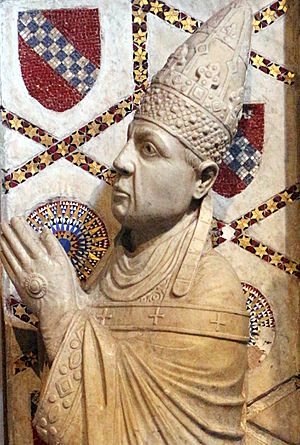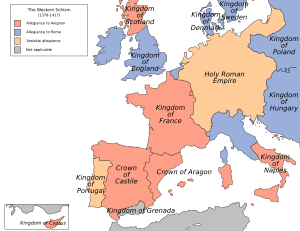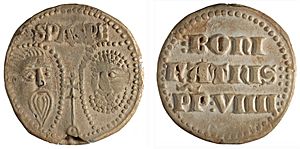Pope Boniface IX facts for kids
Quick facts for kids Pope Boniface IX |
|
|---|---|
| Bishop of Rome | |

A statue of Boniface IX from around 1390-1410, found in Saint John Lateran.
|
|
| Church | Catholic Church |
| Papacy began | 2 November 1389 |
| Papacy ended | 1 October 1404 |
| Predecessor | Urban VI |
| Successor | Innocent VII |
| Opposed to | Avignon claimants: |
| Orders | |
| Consecration | 9 November 1389 by Francesco Moricotti Prignani |
| Created Cardinal | 21 December 1381 |
| Personal details | |
| Birth name | Pietro Cybo Tomacelli |
| Born | c. 1350 Naples, Kingdom of Naples |
| Died | 1 October 1404 (aged 53–54) Rome, Papal States |
| Previous post |
|
| Coat of arms | |
| Other Popes named Boniface | |
Pope Boniface IX (born Pietro Tomacelli) was the leader of the Catholic Church from November 2, 1389, until his death in October 1404. He was the second pope based in Rome during a difficult time known as the Western Schism. During this period, there were two (or sometimes three) popes, each claiming to be the true leader of the Church. The other popes, called "antipopes," were Clement VII and Benedict XIII. They lived in Avignon, France, and were supported by the French king. Boniface IX was the last pope to use the name "Boniface."
Early Life and the Schism
Boniface IX was born around 1350 in Naples, a city in what is now Italy. His birth name was Pietro Tomacelli. His family was important and came from Genoa. Some people at the time said he wasn't very educated or skilled in church business. However, he was known for being careful and smart during a very challenging time for the Church.
The Western Schism was a big problem. It meant the Catholic Church was split, with different parts of Europe supporting different popes. When Boniface IX was chosen as pope in 1389, countries like Germany, England, Hungary, Poland, and most of Italy accepted him. But the rest of Europe supported the Avignon Pope, Clement VII. Both popes declared that the other was no longer a member of the Church (they excommunicated each other).
Just before Boniface IX became pope, Clement VII in Avignon had crowned a French prince, Louis II, as king of Naples. Boniface IX, however, supported a young man named Ladislaus. Ladislaus's family had always backed the popes in Rome. Boniface IX made sure Ladislaus was crowned King of Naples in 1390. For the next ten years, they worked together to remove the French forces from southern Italy.
Leading the Church
During his time as pope, Boniface IX managed to gain more control over the city of Rome. He strengthened important places like the Castel Sant'Angelo and even the bridges. Sometimes, he had to live in safer cities like Assisi or Perugia because Rome could be dangerous. He also took back control of the port of Ostia. Slowly, he brought many castles and cities in the Papal States back under the Pope's rule. This helped shape how the Papal States would look in the 1400s.
The Avignon Pope, Clement VII, died in 1394. But the French cardinals quickly chose a new pope, Pedro de Luna, who became Benedict XIII. Over the next few years, many people, even Boniface IX's strongest supporters like the King of England and the King of Germany, asked him to step down. They hoped this would end the Schism. But Boniface IX refused. People also wanted a large church meeting, called an ecumenical council, to solve the problem. However, this idea didn't make much progress while Boniface was pope.
During Boniface IX's rule, two special "jubilee" years were held in Rome. A jubilee is a holy year when pilgrims can receive special blessings. The first jubilee in 1390 was started by the previous pope. Many people from Germany, Hungary, Poland, Bohemia, and England visited Rome. The second jubilee in 1400 brought huge crowds of pilgrims to Rome, especially from France. This happened even though there was a terrible plague at the time. Pope Boniface IX stayed in the city during this difficult period.
In 1399, groups of people called the Bianchi or "White Penitents" appeared. They wore white clothes with hoods and a red cross on their backs. They walked from city to city, singing hymns and believing that God's judgment was coming. At first, Boniface IX and the Church leaders supported their religious passion. But when they reached Rome, Boniface IX had their leader executed, and the groups soon broke up. The Pope eventually stopped these wandering crowds, as they could be easily influenced by troublemakers.
In England, a preacher named John Wyclif spoke out against the Pope. The English king and church leaders were unhappy because Boniface IX was giving church jobs in England to his friends in Rome. Boniface IX also started new ways to make money for the Church. For example, he would take half of the first year's income from any church job given out. He even sold the "expectation" of getting a job, meaning people paid for the chance to get a job later. If someone offered more money, the Pope might cancel the first sale. This made many people angry. The English Parliament passed laws to limit the Pope's power to appoint people in England. Boniface IX eventually had to agree to the English king's demands.
In Germany, the powerful princes decided to remove King Wenceslaus in 1400. They chose Rupert as the new king. In 1403, Boniface IX officially recognized Rupert as the new King of Germany.
In 1398 and 1399, Boniface IX asked Christian leaders in Europe for help for the Byzantine emperor, Manuel II Palaeologus. The emperor was being threatened by Sultan Bayezid I at Constantinople. However, there wasn't much interest in starting a new crusade at that time. Pope Boniface IX also made Saint Bridget of Sweden an official saint in 1391. He also helped establish new universities in Ferrara (1391) and Fermo (1398), and confirmed the university in Erfurt (1392).
Boniface IX died in 1404 after a short illness. Like other rulers of his time, he needed a lot of money. The cost of wars was rising, and he needed to give gifts to his supporters. People at the time often accused rulers of being greedy. Boniface IX was also criticized for his money-making methods. However, the Church had lost a lot of income because the popes had been away from Rome for so long. They also needed money to make Rome safe and to fight wars to regain control of the Papal States. Boniface IX did make sure his family, including his mother, brothers, and nephews, were well taken care of.
See also
 In Spanish: Bonifacio IX para niños
In Spanish: Bonifacio IX para niños



